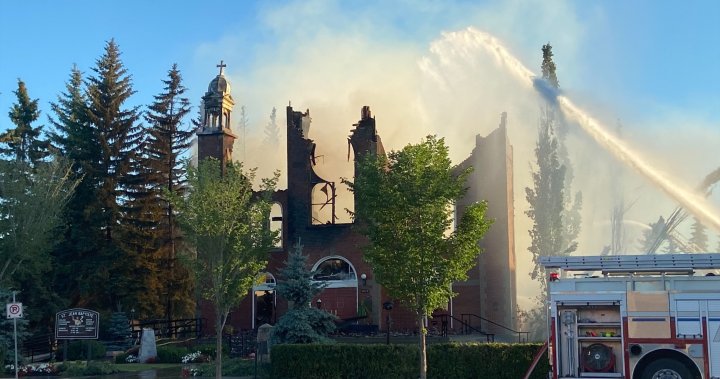Prime Minister Justin Trudeau expressed disappointment Wednesday about multiple recent fires at churches across Canada, saying “destroying places of worship” is “not the way to go.”
Trudeau’s comments come after various investigations into what police forces have described as “suspicious” fires — some believed to be arson — at several community churches in recent weeks, both Catholic and Anglican.
Numerous churches have caught fire and burned across the country over the course of the last two weeks.
Read more:
‘Of course it’s suspicious’: 2 more Catholic churches burn in B.C.’s Southern Interior
Four small Catholic churches on Indigenous lands in rural southern British Columbia have been destroyed by suspicious fires and a vacant former Anglican church in northwestern B.C. was recently damaged in what the RCMP said could be arson.
Two recent incidents on the Siksika First Nation in Alberta are also under investigation.
On Monday, the RCMP said a fire was deliberately started at the Siksika First Nation Catholic Church. On Tuesday, they said an attempt was also made to start a fire inside the Siksika Anglican Church but was unsuccessful.
Alberta’s RCMP is also investigating the burning of the St. Jean Baptiste Parish church, which unfolded on Wednesday.
The fires have come following the recent discovery of unmarked graves at former residential school sites in British Columbia and Saskatchewan.

The discovery of what’s believed to be the remains of 215 children in unmarked graves at a former residential school site in Kamloops, B.C. less than one month ago sparked a flurry of similar investigations into Canada’s former residential school sites.
Last week, an estimated 751 unmarked graves were found at the site of the former Marieval residential school in Saskatchewan.
Just Wednesday, the Lower Kootenay Band said ground-penetrating radar has revealed the human remains of 182 people in unmarked graves at the site of the old St. Eugene’s Mission Residential School in Cranbrook, B.C.
Minutes after the bodies were found, National Chief of the Assembly of First Nations Perry Bellegarde pressed for further investigations into the sites of all residential schools.
“This is a validation of what the survivors have been saying, that there are unmarked graves and that there has been death in these institutions,” he said.
Read more:
‘Not something you can get over’: Survivors, youth reflect on lasting residential school impacts
When asked, Bellegarde also condemned the church burnings.
“I can understand the frustration, the anger and the hurt and the pain,” he said. “But to burn things down is not our way. Our way is to build relationships and come together.”
Alberta Premier Jason Kenney called the recent fire in Alberta “an attack on Canadian values” and “a hate-motivated act of violence.”
“This is appalling. This scale of violence, attacking a faith community is an attack on the constitutionally protected freedom of religion,” he said.

Churches have also burned in the Maritime provinces.
The RCMP in Indian Brook, N.S., are investigating a suspicious fire that damaged a Roman Catholic church on Wednesday. The St. Kateri Tekakwitha Church serves the Sipekne’katik First Nation.
It is located just north of Halifax, roughly eight kilometres away from the former Shubenacadie Indian Residential School, which was once the largest residential school in Atlantic Canada.
Canada’s first government-funded, church-run residential schools opened in the 1870s. The last one closed outside Regina in 1996. More than 60 per cent of the schools were run by the Catholic Church.
At least 150,000 First Nations, Inuit and Métis children separated from the families passed through the residential school system, according to Crown-Indigenous Relations and Northern Affairs Canada. Many never returned home.
The Indian Residential Schools Resolution Health Support Program has a hotline to help residential school survivors and their relatives suffering with trauma invoked by the recall of past abuse. The number is 1-866-925-4419.
— With files from the Canadian Press
© 2021 Global News, a division of Corus Entertainment Inc.














































